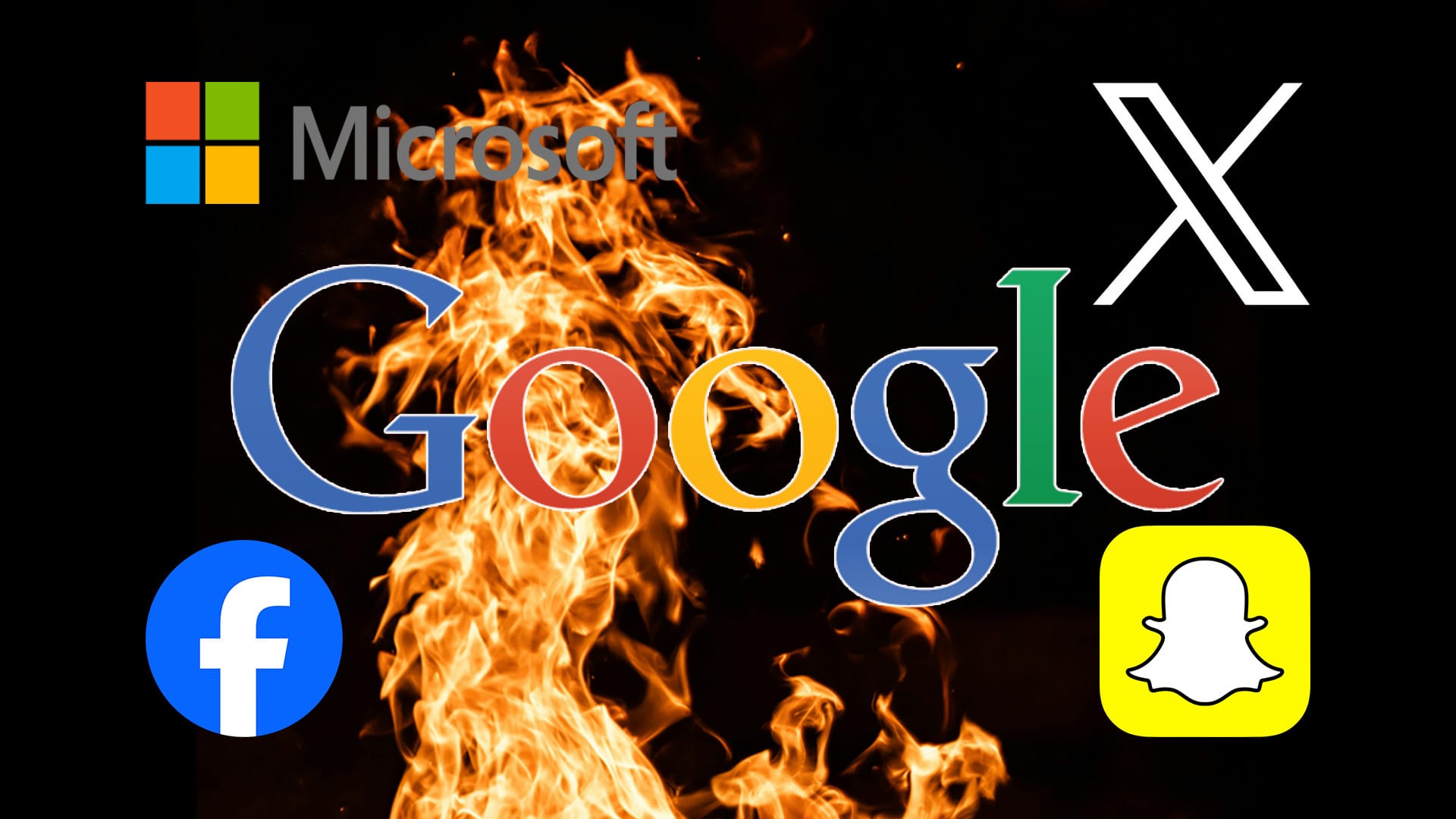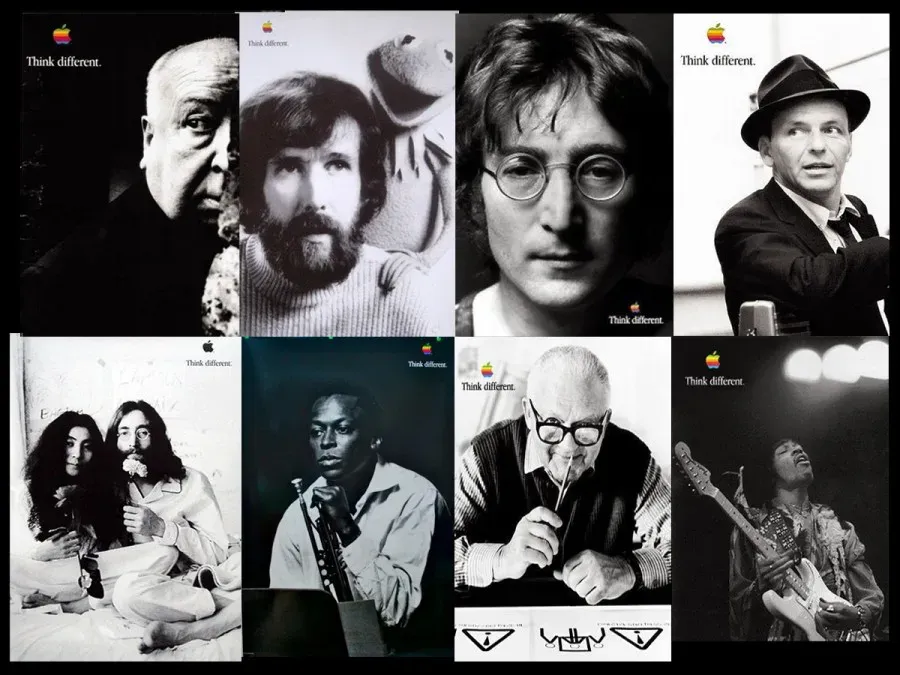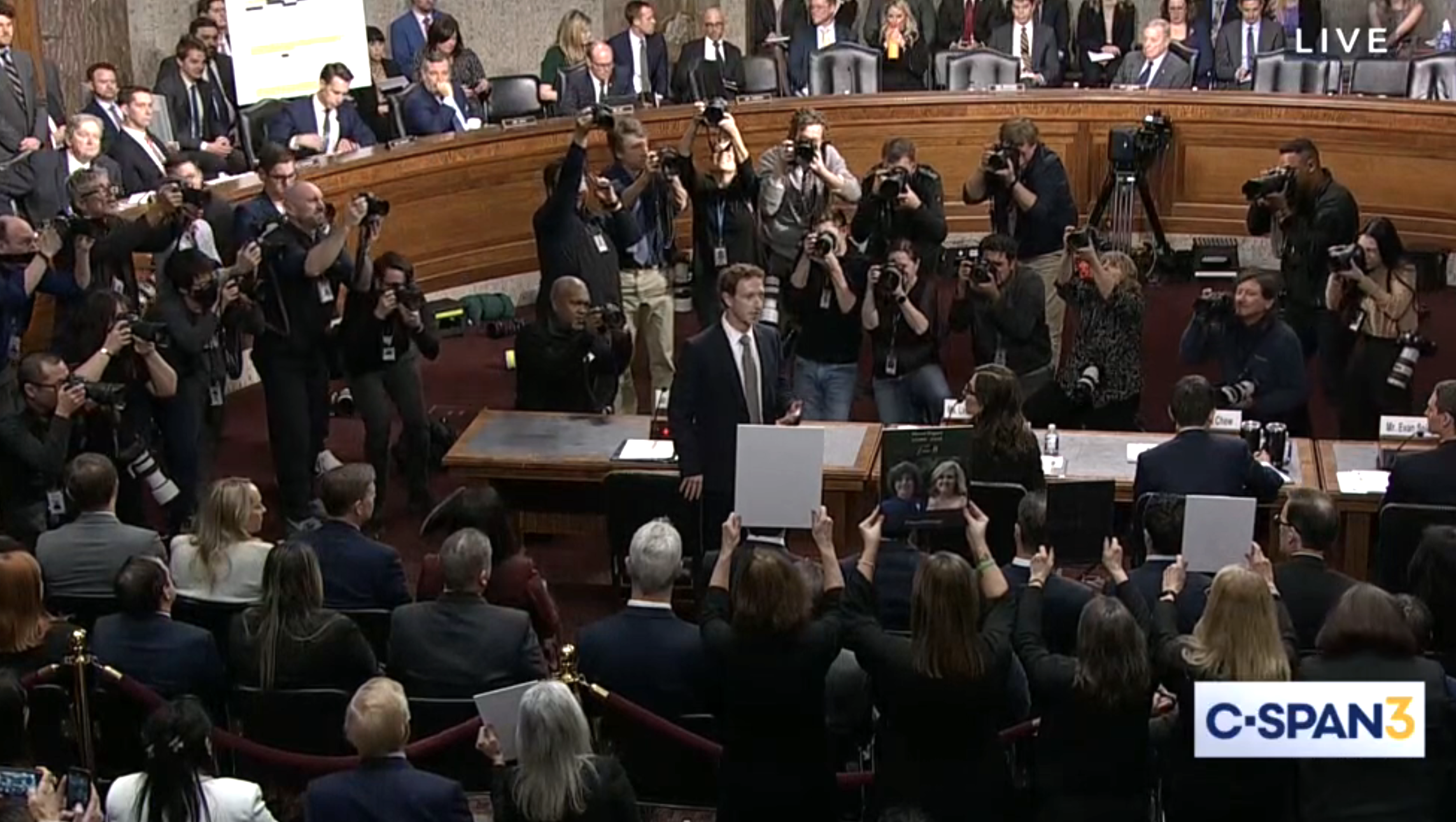Disrupting Evil
The nerds and geeks that were the butt of jokes in high school became "tech bros" and the titans of the information revolution. And with great power, came great irresponsibility.

"I fear the day when the technology overlaps with our humanity. The world will only have a generation of idiots." -Albert Einstein
Remember Google's original tagline? "Don't be evil." Pretty simple. Direct. Back when the tech sector was fresh and fairly utopian. 'Imagine– we'll all become closer to each other as we share knowledge and make our world a better place!' Sweetly naive? It seems naive now, absurdly so. What's Google's current mission statement? "Our mission is to organize the world’s information and make it universally accessible and useful."
OK, I'm conflating the tagline with their mission statement. Their current tagline is "Do the Right Thing." Very Spike Lee-ish. The whole tagline reads, “Employees of Alphabet and its subsidiaries and controlled affiliates should do the right thing—follow the law, act honorably, and treat each other with respect.” (Google was restructured in 2015 as Alphabet, Inc., an umbrella for Google and its now many subsidiaries.) To be accurate, their original mission statement was “to organize the world’s information and make it universally accessible and useful.” (And then, you know, sell every bit of personal data we can collect on you.)
From "Don't be Evil" to "Do the Right Thing" doesn't seem a really big pivot, so, why the change? Current and former employees say there started to be a bit of tension over Google's data mining practices, censorship, and personal privacy issues. Some folks thought that was kinda evil. "Do the Right Thing" is a bit more subjective, and adaptable. If you remember Lee's movie of the same name, things didn't turn out so well - a giant conflagration resulted when everyone had their personal idea of the "right thing."
The two grandparents of big tech, Microsoft and Apple, were fairly benevolent early on with their idealistic tags. Microsoft in 1987 had "Making it Easier." Then there was "Where do you want to go today?" followed by "Your potential. Our Passion," "Be What's Next," "Where Do You Want to Go Today?" and currently, “We believe in what people make possible.” Not as inspiring as they probably think they are, but fairly humane.
It was 1997 when Apple intro'ed its famous "Think Different" ad campaign.

Disruption? Mmmm, a little. But the focus was on positive change, on progress, achievement, on becoming the best. The customer was implicitly encouraged to be that change, to 'Think Different.' ("Think Different" involved a little bit of shade thrown at IBM, whose motto was simply "Think" and "Think IBM.") The campaign officially ended years ago, but the slogan still appears on some Apple packaging. It is considered one of the most successful ad campaigns in history. An accompanying video commercial was produced, with one version (not aired) narrated by Steve Jobs, the famous founder/guru of Apple. It was played as a memorial piece when he passed in 2011.
The "Think Different" ad from '97. Note the focus on revolutionary-historical figures. "Disrupters," yes. But ones that constructively moved forward.
Though Apple (via its branding and advertising) has been perceived as a compassionate, humane company there are huge blind spots that any massive, industrial company has. Apple was initially known for specializing in education hardware/software (especially for schoolchildren,) yet their computer and later iPhone factories were located in China, known for abusive child labor. Computer parts (as with almost all electronics) use 'rare earth minerals,' mined with environmentally unfriendly practices in China and other countries. At one point during the Obama administration, the President met with Jobs and other Silicon Valley leaders and asked what it would take to build iPhones in the United States. "Those jobs aren't coming back," replied Jobs, firmly and without hesitation.
The computer/tech revolution was (and is) unstoppable. Young, idealistic engineers and programmers were absolutely changing, er, disrupting, the world, even if that meant that child labor and terrible environmental practices were (and continue to be) part of the change.
Considered the fourth stage of the industrial revolution, (steam, electricity, machines/automation, and now "cyber-physical systems") computers started upending - disrupting - everything. Sure, IBM mainframes that took up acres of floorspace helped get us to the moon in the 60s, but it was no time before that kind of computational power could be packed into a case that fit underneath a small TV-type monitor. Typewriters were replaced by word processors. Handwritten ledgers that were calculated by mechanical adding machines and small calculators were replaced by spreadsheet software, which could not only calculate unlimited rows/columns of numbers in nano-seconds. Within what seems now like just a couple of years, that same computing power was crammed into a palm-sized cell phone (another "disruptive" technology that was racing forward.)
A funny thing happened on the way to making science fiction a reality. The money became absurd. The entire world needed computing power. And computers, it turned out, were not a one-time expense. Between hardware and software advances, gazillions were being spent on the revolution, and the constant "upgrades/updates" to that revolution. It took a while for an educational pipeline to produce enough talent to keep up with development and production. Programmers, engineers, and tech companies wield immense power. Successful tech companies were insanely profitable. The nerds and geeks that were the butt of jokes in high school became "tech bros" and the titans of the revolution. And with great power, came great irresponsibility.
For every word processing program, typists and secretaries went out of work. Spreadsheets replaced bookkeepers and accountants, CAD programs replaced draftsmen, computer automation replaced factory workers, and the list of displacement goes on and on. Critics of that criticism will note that while some jobs are displaced, others are created. Yes, old-school assembly line workers were laid off, but computer-literate controllers were hired to operate a modern assembly line. But those jobs aren't interchangeable. The high-tech economy requires a bit of higher education – a blue-collar job can usually be mastered with a high school diploma or less along with some on-the-job training. In other words, those laid-off assembly linemen would find it difficult to learn to code cutting-edge software.
Worse yet, for every productive, socially beneficial bit of technology developed, an equal bit of risky or even malicious tech sprouted up. Email not only disrupted traditional mail service, but it also gave easy and instant two-way communication between grifters and cons and virtually anyone, anywhere. A multitude of transmission channels made audio and video exchange inexpensive and simple. For every corporate PowerPoint presentation shared or home movie sent to friends, a hundred pornographic images and films could be distributed. Social media sites were developed so that individuals could instantly share photos, videos, personal information, links to other content on the internet, advertising, and live "chat" - all on one community website. This kicked the door open for scammers, criminals, and predators to spread misinformation, entrap the unwary into fraudulent transactions, and entice children and seniors into abusive relationships (sexual, financial, etc.)
What was the response of the tech bros as the industry gained steam and billion-dollar valuations?
“Move fast and break things. Unless you are breaking stuff, you are not moving fast enough.”
That was the famous quote by Facebook ("Meta") CEO Mark Zuckerberg and became the company's internal motto for years. In a 2009 interview he said, "Unless you are breaking stuff, you are not moving fast enough." The Facebook PR crew would try to explain that the expression applied to their internal processes... software needed to be updated, tested, and modified - and when that happens, things "break" and need to be reinvented. But - the public (and Meta's competitors) had a wider view of the expression. Never mind that "breaking things" had previously been the exclusive domain of angry toddlers and bored housecats.
"Disruptor" became the descriptor that entrepreneurs, leaders, and high-tech companies wanted to be known as. "Dream big and be disruptive. If you are doing the same thing as everyone else, you've already failed." -Kendra Scott, entrepreneur, fashion designer. "Modernity is disruptive, and I endorse that." -Emmanuel Macron, president of France.
Technology is not automatically evil. And let's face it, by definition, any new technology, invention, process innovation, or change is disruptive. But the reinforced message seems to be simply, "disrupt." When that's the end in itself, there is no analysis of the long-term effects of change or any assurance of an overall positive outcome. Disruption becomes destruction.
In a recent essay (from her new book) tech writer Kari Swisher recalls:
French philosopher Paul Virilio has a quote I think about a lot: “When you invent the ship, you also invent the shipwreck; when you invent the plane, you also invent the plane crash; and when you invent electricity, you invent electrocution. Every technology carries its own negativity, which is invented at the same time as technical progress.”
When apps such as Facebook, Instagram, TikTok, and Tumbler are used by kids and teens, the kids are easily exploited. In a Senate hearing at the end of January, several of the Techie Titans were called to answer for the many teen suicides that had "disrupted" so many lives. (Parents and sociologists blame social media for promoting or at least allowing sexual solicitation of minors, child porn, drug sales, bullying, and content promoting eating disorders and suicide.) At the hearing, parents held up photos of their dead children. Some were driven to suicide by mass shaming. Several had been threatened with shaming by being "sextorted" (tricked into sending photographs of themselves fully or partially naked by criminals who then demand money, repeatedly, threatening to post the photographs online).
One of the senators dutifully asked Zuckerberg if he shouldn't apologize to the families. Many were surprised when He stood to say:

I'm sorry. Everything that you all gone through, it's terrible. No one should have to go through the things that your families have suffered and this is why we invest so much and are going to continue doing industry-leading efforts to make sure that no one has to go through the types of things that your families have had to suffer. -Mark Zuckerberg
The tech bros wore their media-trained-sorrowful faces for the senators' camera-ready-scolding faces. Then the tech wizards quietly pushed some massive campaign checks under the table to the awaiting claws of the Senators, while they texted their lobbyists to sound the charge. All agreed that something would be done.
In his Substack letter, "After Babel," Jon Haidt noted,
We saw parents holding up photographs of their dead children...
“How can you do this to our children?” the senators asked, in a variety of ways. The response from the social media executives was usually some version of “But Senator, we spend X billion dollars each year to create industry-leading tools to find and remove such content.” That phrase, “industry-leading,” was used six times during the hearing; five times by Mark Zuckerberg, and once by Shou Chew from TikTok.
You're going to be blown away when I tell you that nothing significant has been done since. Because, you know. <reasons.> <copious amounts of money.> And it's not possible to do anything, right?
The Brits are starting to ban smartphones in schools. There is a social movement there to "delay giving children smartphones until at least 14, with no social media access until 16..." This will be an uphill battle, yes, because "research has shown that 91% of children in the UK own a smartphone by the time they are 11 and 44% by the time they are nine." Those wacky Brits, trying to limit kids' cell phone usage. Next thing you know, they'll be offering National Health Care plans.
Even the "good tech bros" are ultimately compromised - there's too much money and status on the line. Snapchat CEO Evan Spiegel was the country's youngest multi-billionaire by the time he was 25. In an interview with Kara Swisher in 2018, Evan said,
"I think the important thing for us is building that muscle of not putting numbers before doing the right thing for the people that use our service. This is a really good time to do that because embedding that culture really early in our business is extremely important, and so for our team to see our commitment to doing the right thing for our community, doing the right thing for people over the long term I think will really serve the business for a long period of time."
Spiegel found himself at the table with the other CEOs in the Senate hearing, also issuing an apology to parents (some whose children had died after they purchased drugs on Snapchat.) “I’m so sorry that we have not been able to prevent these tragedies.” He then outlined the measures they took to protect young users. Didn't much seem to have worked out? Snapchat is in at least one wrongful death lawsuit. To his credit, at least he showed up and made an apology in person.
Twitter (X) CEO Linda Yaccarino was at the Senate hearing, taking the heat for Elon Musk. It's no secret that Musk micromanages every decision for all of his companies. And it's no surprise that he would send Yaccarino in his place.
-You Will Note: I keep using the term "tech bros" in a somewhat disparaging manner, purposely. It certainly suggests that the field is entirely male. Not quite true, though close. From the beginning, the tech sector has been a boy's club.
1. The latest data puts the percentage of the technology workforce identifying as female at 27.6%. (The total number of women in tech-related positions has actually decreased by 2.1% over the last few years.)
2. Roughly 17% of technology companies currently have a woman serving as CEO.
3. A 2022 survey found that a staggering 91.88% of software developers are men.
4. Women in tech are most numerous in the role of operations research analyst, with 51% representation, according to one survey.
5. Black and Latina women in tech are represented at 2.2% and 1.9%, respectively.
Elon Musk, bazillionaire man-child somewhere on the evil spectrum, several years ago almost stood up to Trump. Before the 2016 election, Musk said Trump was “not the right guy. He doesn’t seem to have the sort of character that reflects well on the United States.” By the end of the pandemic - after several of his businesses had been forced to temporarily shut down production - Musk went full MAGA libertarian. Musk and Trump are twin sons of different reptiles.
Musk, in what seemed to be a fit of pique, would spend billions to buy controlling interest in his creation, Twitter (or X, or whatever.) This allowed him to restore Trump's Twitter account after he had been removed for violating their terms and the risk he posed for inciting violence. (Musk has since opened the site up to all forms of ultra-right-wing groups, conspiracy theorists, and insurrectionists.) The relationship goes back and forth. Musk publicly supported DeSantis' candidacy, so, there will be lots of ring-kissing and campaign donations to get back in the good graces of the king. There are just too many government contracts at risk with SpaceX and his satellite companies.
Of course, Trump was and is the ultimate "disrupter."
And he has taken the "Move fast and break things" mantra to a new, lower level.
CPAC, (the Conservative Political Action Conference that serves as a barometer for conservative 'thought') is happening as I write this. On opening day, right-wing conspiracy theorist and former OANN correspondent Jack Posobiec was cheered as he declared,
"Welcome to the end of democracy! We’re here to overthrow it completely. We didn’t get all the way there on January 6th, but we will endeavor to get rid of it and replace it with this right here,” he said, holding his fist in the air. “That’s right, because all glory is not to government, all glory to God.”
Steve Bannon, the Trump-advisor and "flood the zone with shit" Trump-pardoned grifter/provocateur, was heard cheering Posobiec - "All right! Amen!" And did I mention that Nazis were admitted to the conference this year and openly walked around passing around conspiracy theories and using the n-word out loud? Ah, those wacky "conservatives."
Posoiec would followup,
"After we burn that swamp to the ground, we will establish the new American republic on its ashes, and our first order of business will be righteous retribution for those who betrayed America."
"Burn it all down." That's what that's all about. It's the tagline of today, the motto that motivates. When the speech is being wrapped up, it's the call to action. When the debate is lost or pesky facts get in the way of political declaration, it's the easy solution in a complex world.
(And let's be honest. More than a handful of left-wing radicals have been heard to issue this same battle cry.)
Mookie, (Spike Lee,) motivated by the unjust death of his friend at the hands of the police, starts the riot which will Burn it All Down.
Remember Google's "Don't Be Evil," which morphed into Spike Lee's movie-inspired "Do the Right Thing"? As previously mentioned, the movie didn't end so well – the lead character, "Mookie," (played by Lee himself,) tossed the trash can through his employer's pizza shop window. It led to the riot which ignited the fire.
Disrupt: Burn it all down.
Now what, Mookie?
Be sure and subscribe to receive our stories weekly.
If you can, we'd love it if you'd become a paid subscriber.